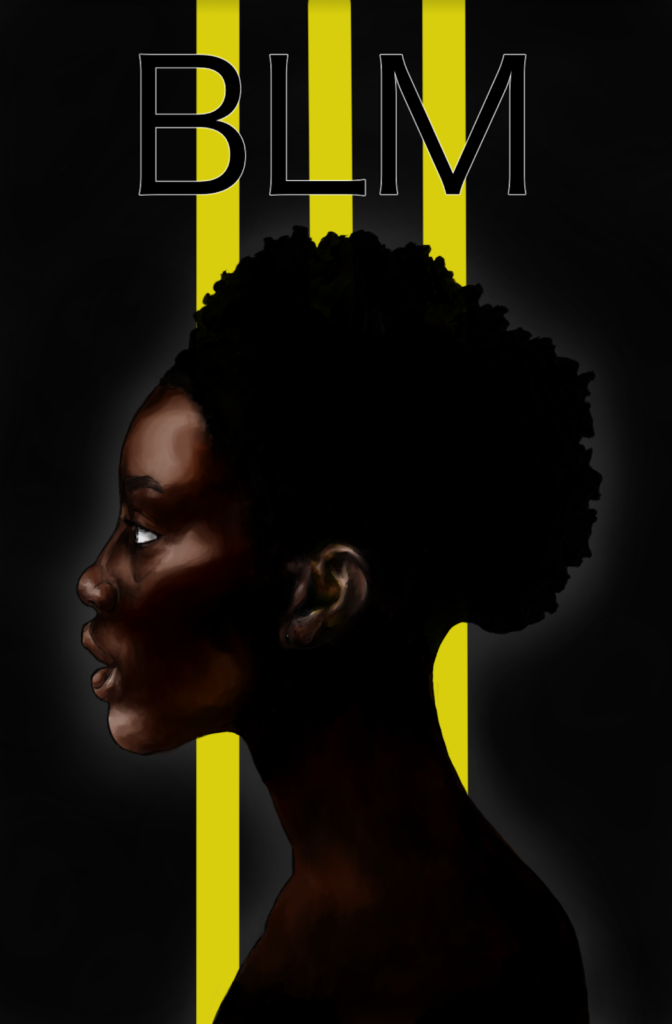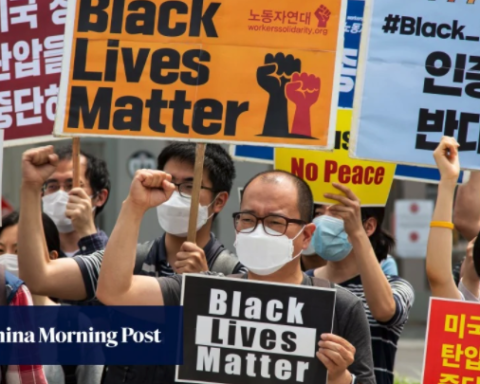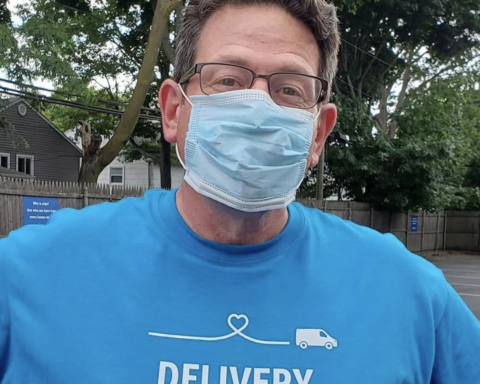Art by Katherine Giroux, 15
WASHINGTON, DC—After months of quarantine due to the novel coronavirus, the country erupted in anger and protests following the May 25 killing of George Floyd by a police officer in Minneapolis who knelt on his neck, even when Floyd kept pleading, “I can’t breathe.” Floyd was an African American man whose killing was the latest in a string of Black murders by white policemen. Breonna Taylor and Ahmaud Arbery suffered the same fate, but Floyd’s death sparked fury in Americans of all colors, leading to global protest. These two unprecedented events, back to back, have brought a heightened level of anxiety to many people.
In fact, The Washington Post reported that within a week of the reveal of Floyd’s killing, anxiety and depression among African Americans shot to higher rates than experienced by any other racial or ethnic group, with 41 percent screening positive for at least one of common depression symptoms. Indeed, we are amid a national mental health crisis. Since the pandemic started in March, “nearly half of Americans report the coronavirus crisis is harming their mental health, according to a Kaiser Family Foundation poll.”
Dr. Ioana Razi, a pediatrician in the Washington, DC area, said that personally and in her practice, she’s been seeing varying amounts of stress, anger, and sadness in children, teens and young adults from ages two to 21. Depending on their age and therefore ability to understand the seriousness of this situation, they can be affected in different ways—from toddlers and young elementary school-aged children missing their friends, teachers at school and extended family, to older teens and young adults feeling very depressed and/or lonely, possibly not wanting to live anymore.
Suicide, in fact, has risen by 30 percent in the last decade according to Pew Research. Pew reported 47,000 suicides in 2017 and warns that, on topof the 79,000 lives lost to the virus, there may be 75,000 Americans who lose their lives to misused drugs and alcohol and suicide in 2020.
Dr. Razi suggests a good way for parents to support their children is simply to “keep daily rhythms between work and being part of the family and spend time with kids, so that they know that they are still supported.” She also suggests picking up current hobbies or learning new skills is a good way to cope with how they are feeling. She adds, “if your child is having trouble with his or her emotions, encourage them to channel that into talking about them or finding an activity that they enjoy doing.” For younger children who are feeling lonely she feels that “finding another group or family to spend time with often (being safe, of course) will help them decrease isolation as well.”
William Wan of the Washington Post recently reported that the virus is taking a serious toll on Americans’ mental health. “Many U.S. hospitals and clinics are now on the verge of collapse, with anxiety and depression rapidly rising […] fear, trauma, and isolation are causing problems: higher rates of depression, PTSD, and suicide cases.”
This is further complicated by the fact that many teens are coping with their anxiety by participating in protests and the health risks of joining protests during Covid are causing anxiety among parents who don’t know how to support their children and keep them safe.
Dr. Joy Kassett, a psychologist who works with children and teens, notes that in her practice she’s observed that many young people are feeling uplifted by the activism they are seeing. “Most of whom I see say they’re glad to see people taking action while protecting themselves at the same time,” she said.
She’s also noticed that “teens who participate in the protests try to social distance, but sometimes it can be hard to do that. They are also willing to take uncertain risks because the racial issues are very important to them. Most protests are non-violent and while the more violent protests may create anxiety, they want their voices to be heard regardless.”
She suggests that teens who aren’t in their best state of mind seek therapy or continue if they are already in therapy. This goes especially for children who can’t speak to their parents or don’t have a strong support system at home. Besides turning to therapy or support groups, young people who are feeling or thinking negative thoughts have put in the time to help organizations that work for BLM or BLM-related topics or subjects. This has given them a support group, and a chance to bring their voices into a place where their thoughts and opinions can be shared. Parents can support their children through this by making sure they take necessary precautions to stay safe from the virus.
Anne Erickson is a therapist from Greensboro, NC and also a Mom to two daughters. Her experience as a mom gave some helpful insight into what it’s like to work with patients struggling with their well-being and listening or trying to listen to her daughters’ worries and questions, too. She says that children, especially ones on the older side, like hers, really need to be listened to and that “it can sometimes be hard for a teen or preteen to express what he/she wants to get across, since that age group most likely has other stress going on in their lives.” She also explained the scientific benefits of a hug, as well as sleeping next to a loved one. She worries about her daughters’ mental health as well as her own, as a result of days with no routine and disrupted sleep patterns, which she is also seeing, in a few of her patients.

Another technique she suggests to deal with anxiety is called mirroring. This involves one person saying something they like or appreciate about another person, and then the recipient repeats what they heard before, then saying something they appreciate about the other person. This creates a sense of understanding and a connection between the individuals. This also relieves physical stress and can be a relief on anyone’s mind if they are tense.
The importance of dopamine and oxytocin in our bodies is also very crucial to relieve stress and therefore anxiety. This is why actions like hugging, cuddling, as well as the “mirroring” mentioned above can really help. Dopamine and oxytocin are the two feel-good chemicals that gestures of affection can trigger in someone to feel relaxed and at ease. According to The Washington Post, “more than half of American adults feeling under pressure or stressed during the pandemic, including depressive thoughts and substance abuse,” these people might need the best thing there is for them: support and therapy or just a simple hug and an “Everything is OK” from a loved one.
Even though we as Americans are experiencing the current situation—the pandemic, along with ongoing racial issues—on different levels, we can still come out of this stronger if we have the right help and resources.







